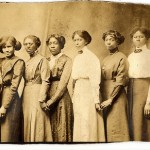My students are often shocked when I tell them the reality of Memorial Day. When I ask them about the holiday, they tend to believe it had its roots in World War II, the same war that was fought, in their minds, in order to stop the Holocaust (though it is far more complicated than that).
Few of my students know about the African-American roots of Memorial Day. Few of them know that it began after the Civil War. The history book is silent on the holiday altogether, though they do mention Veteran's Day.
When I mention the reality of Memorial Day or the historical reality of Columbus or even the overt racism of Woodrow Wilson, people tell me that I'm teaching "revisionist history." It's somehow seen as unpatriotic to tell the truth about democracy. I'm somehow "bashing" America when I explain our imperfections.
I've been told this in random places: by a parent in a conference, by a man at church, by someone at a birthday party who said, "Please tell me you're not feeding them that revisionist nonsense."
And yet, I can't think of any other area where revision is viewed as a bad thing. From a relational lens, who would advocate an adult looking back at childhood and being honest about the mistakes of a parent or guardian? Is it not more loving to say, "I know your faults and yet I love you anyway?"
From an institutional lens, I can't think of any system that we wouldn't look at with at least a few questions. Often, the people who tell me I shouldn't question America in the past are the same people who advocate holding a critical view of our current government. Should we not also apply the same critical lens to the past?
From a subject matter lens, it seems that revision is welcomed in most fields. Medicine and science must remain up to date. Writers are constantly asked to revise their works until they are truly publishable. And yet, history, when revised, is viewed through a threatening lens. We, as teachers, are seen as defacing a sacred narrative.
The truth is that history needs to be revised, because we gain better perspectives and better evidence. People forget that it is part of the social sciences for a reason. It's not a liberal-conservative thing. Both sides have some embarrassing stories in our past.
I'm not sure why revisionist history is threatening to people. Is it about power? Is it about maintaining a worldview? Is it about simple nostalgia and a belief that we need to return to a better past that was never quite as good as we thought?







